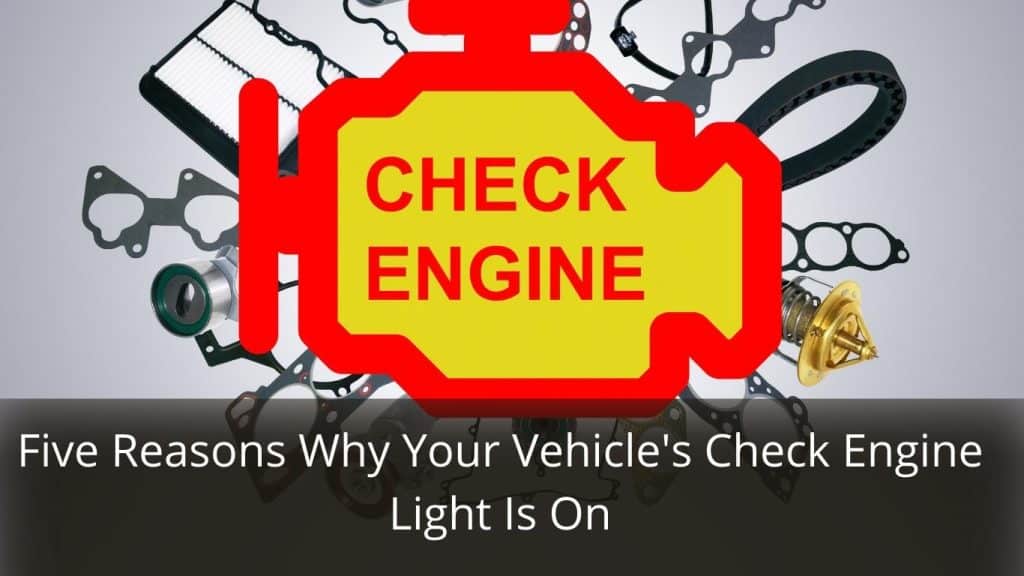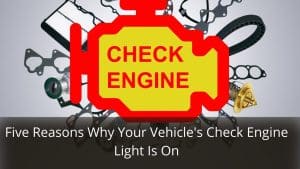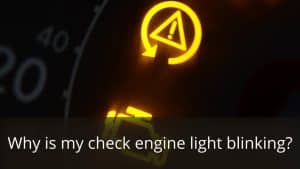Why is my check engine light on?
If you’ve ever had a check engine light come on, then it’s likely you want to know why. In this article, we’ll go over five of the most common reasons for your vehicle’s check engine light to be on and what you can do about it.
1) Incorrect Gas Cap: If your gas cap is loose or damaged, the sensor may detect a change in pressure and set off the check engine light.
2) Water In Fuel: If you’ve been driving through deep water, chances are your vehicle’s fuel system may have picked up some water which can trigger the check engine light.
3) Oxygen Sensor: The oxygen sensor monitors how much oxygen is in your exhaust. If it detects a problem, then the sensor will set off the check engine light.
4) Catalytic Converter: The catalytic converter is part of your car’s exhaust system and helps reduce the amount of pollution in the air. If it’s not working properly, your car’s check engine light will turn on.
5) Fuel Pressure Sensor: If a fuel pressure sensor fails, it can cause the check engine light to turn on as well.
What do I do if my check engine light is on?
The check engine light is a warning that your vehicle may have an issue with the emissions system. If you’re experiencing any of these symptoms, it’s best to get your car checked out:
-The car is producing unusual noises when accelerating or turning.
-There’s a noticeable difference in the way your engine idles.
-You’re experiencing difficulty with acceleration, or the engine feels sluggish.
-The check engine light is on, and you are experiencing any of these symptoms.
-The car is producing unusual noises when accelerating or turning.
-There’s a noticeable difference in the way your engine idles.
-You’re experiencing difficulty with acceleration, or the engine feels sluggish.
-The check engine light is on, and you are experiencing any of these symptoms.
-The car is producing unusual noises when accelerating or turning.
-There’s a noticeable difference in the way your engine idles.
-You’re experiencing difficulty with acceleration, or the engine
What are the five reasons why my check engine light might be on?
There are many reasons why your vehicle’s check engine light is on. Some of the more common ones include a clogged catalytic converter, low fuel pressure, low coolant level, and high gas pressure. If you notice that your vehicle’s check engine light is on, make an appointment with the nearest service centre, We’ll run a diagnostic test to determine the cause of the problem and fix it as soon as possible.
Why is my check engine light blinking?
Check engine lights are blinking for a variety of reasons. The most common cause is that an air and fuel mixture is not being burned completely, which can be caused by dirty or clogged fuel injectors, a faulty oxygen sensor, or even problems with the ignition system.
The check engine light is also blinking if there are problems with emissions control devices such as catalytic converters, fuel evaporation control systems, or diesel particulate filters. This may also be blinking if the vehicle’s computer detects a problem with the way that power is being delivered to your wheels, such as a problem with the vehicle’s transmission or drive train.
Light may also be blinking if there is a problem with the way that your vehicle’s computer is calculating how much fuel to deliver to the engine for optimal performance. It may also be blinking if there is a problem with your vehicle’s emissions control system that causes it to run in a fuel-inefficient manner. The check engine light may also be blinking if there is a problem with your vehicle’s emissions control system that causes it to run in an unsafe manner.
What are the consequences of ignoring my check engine light?
If you are unable to address the light’s warning, it could lead to your car breaking down or even catching on fire. Ignoring a check engine light can also cause excessive fuel usage and increased vehicle emissions.
What does it mean if my check engine light is Red?
If your check engine light is red, it means that there may be a problem with the vehicle’s emission system. A car will emit more pollutants when its catalytic converter isn’t working properly. If your check engine light is red, you’ll need to get it checked out by a mechanic. The lights can also be yellow or orange when they’re not functioning properly.
What does it mean if my check engine light is green?
A green check engine light indicates that the car is in “good” condition. The light may be on because either the battery, alternator, or belt has malfunctioned and needs to be repaired.
A green check engine light is signaling that the car has a malfunctioning battery, alternator, or belt.
How can I reset my check engine light?
If you want to reset your check engine light, all you need is a piece of paper and the car’s owner manual.
- Step 1: Turn off the vehicle and open it up.
- Step 2: Locate the “reset” button on your dashboard.
- Step 3: Press and hold that reset button for 10 seconds before releasing it.



